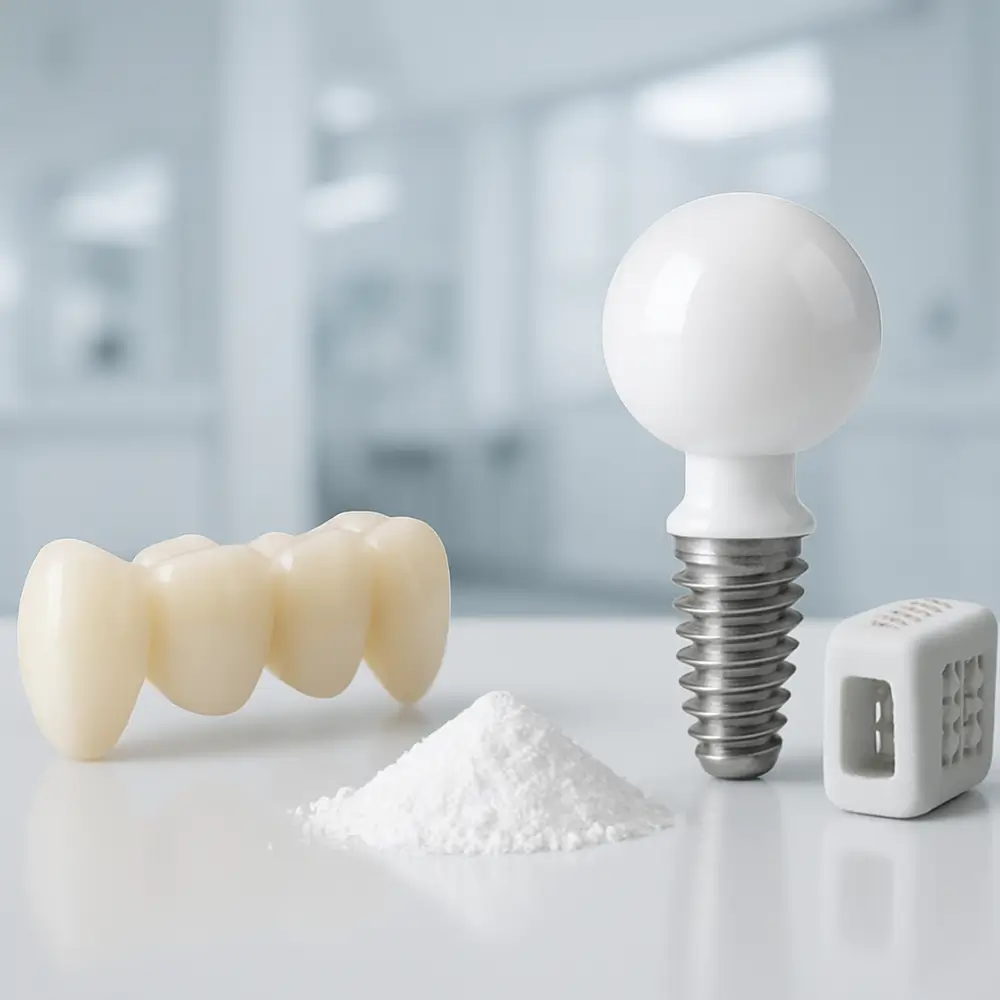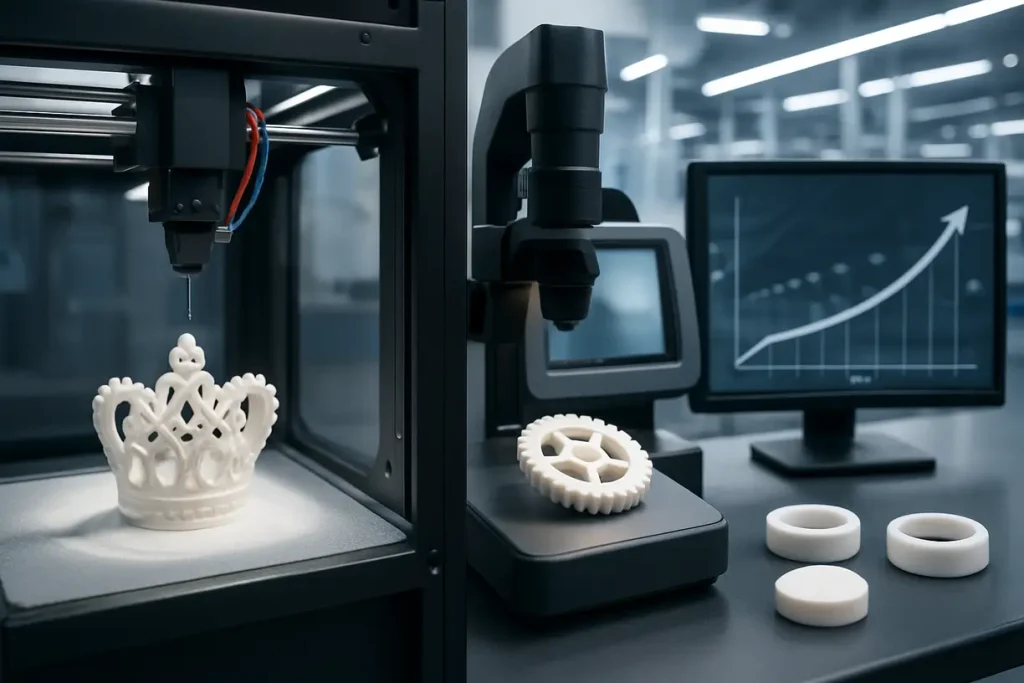Zirconia powder is making headlines in many industries, especially as businesses look for reliable, high-performance materials. But what about its growth as an investment opportunity for 2025? This question is increasingly relevant for purchasing managers and decision-makers who need to allocate funds wisely. Understanding the trends and factors influencing zirconia can help you make informed investment choices. This article offers detailed insight into market demands, technological advancements, and competitive analysis, presenting a well-rounded view of the investment potential in zirconia powder.
As industries evolve, the applications of zirconia powder are becoming more versatile. From its critical role in dental implants to advanced applications in electronic devices, zirconia’s unique properties like strength and temperature resistance make it a material of choice across various fields. The growing emphasis on sustainability also encourages the use of zirconia, given its long lifespan and reduced environmental impact compared to other materials.
The following sections will unpack key trends, risks, and strategic insights to spotlight why investing in zirconia powder could be a fruitful decision.

This image represents zirconia powder’s critical role in dental and medical applications.
What Key Factors Influence Zirconia Powder Growth?
When analyzing why zirconia powder is seen as an attractive investment, it’s critical to understand the main drivers behind its growth. So, let’s break down these influential factors.
First, market demand plays a central role. The increasing need for high-performance materials in diverse sectors, from healthcare to aerospace, has surged. Zirconia powder is preferred for its remarkable durability and biocompatibility, making it a favored choice for dental and medical applications.
Next, technological advancements are key to enhancing production efficiency. Innovations in manufacturing processes have lowered costs and improved quality. Companies are now able to produce finer, more consistent zirconia powders, which enhances their applicability in various industries.
Finally, economic conditions also impact growth. Fluctuations in raw material prices and geopolitical factors can influence production costs and ultimately affect the market. Staying informed about these economic indicators is crucial for investors in this field.
To summarize, factors influencing growth include:
- Increased market demand
- Technological advancements in production
- Economic conditions affecting material costs
The combination of these elements sets the stage for a promising outlook for zirconia powder investment. With this understanding, businesses can align their strategies accordingly.
| Factor | Influencing Aspect |
|---|---|
| Market Demand | Growing need in healthcare and aerospace |
| Technological Advancements | Improved production efficiency |
| Economic Conditions | Price fluctuations of raw materials |
How Does Zirconia Powder Compare to Competitors?
To grasp zirconia powder’s potential, it’s essential to compare it with competing materials. What makes zirconia stand out?
Firstly, zirconia powder excels in several applications due to its unique properties. Unlike other materials, it offers superior strength and can withstand high temperatures. This durability makes it ideal for automotive, dental, and electronic applications.
Competitors like alumina and silicon carbide are also popular, but they often lack the biocompatibility that zirconia provides. This is particularly important in medical fields, where materials must interact safely with the human body.
Moreover, when it comes to cost, zirconia powder can be more expensive upfront. However, its longer lifespan and reduced maintenance costs can justify the investment in the long run. Businesses should weigh these cost implications against the performance benefits that zirconia offers.
In conclusion, zirconia powder stands out for:
- Superior strength and temperature resistance
- Better biocompatibility for medical use
- Long-term cost-effectiveness despite higher initial investment
This comparison highlights why zirconia powder may be a preferable option for many industries, providing a solid case for its investment potential.
| Material | Strength | Biocompatibility | Cost |
|---|---|---|---|
| Zirconia Powder | High | Yes | Higher upfront cost |
| Alumina | Moderate | No | Lower |
| Silicon Carbide | High | No | Moderate |
What Industries Are Driving Zirconia Powder Demand?
Understanding where demand for zirconia powder is coming from is crucial. Which industries are the primary consumers?
The healthcare sector leads demand due to the material’s biocompatibility and durability. Zirconia is widely used in dental implants and prosthetics, offering longevity and patient comfort.
Another significant industry is the electronics sector. Here, zirconia powder is used in various applications, including insulators and capacitors. Its thermal stability is valuable for ensuring reliable performance in electronic devices.
Additionally, the automotive industry is increasingly adopting zirconia for components that need to endure extreme conditions. For example, fuel cells and various engine parts benefit from zirconia’s strength and heat resistance.
In summary, the main industries driving zirconia powder demand include:
- Healthcare: Dental and medical applications
- Electronics: Insulators and capacitors
- Automotive: Fuel cells and engine components
These sectors illustrate the widespread applicability of zirconia powder, bolstering its investment appeal with multiple revenue streams.
| Industry | Primary Application | Key Benefits |
|---|---|---|
| Healthcare | Dental implants | Biocompatibility and durability |
| Electronics | Insulators, capacitors | Thermal stability and reliability |
| Automotive | Engine components, fuel cells | Strength and heat resistance |

This image depicts zirconia powder’s use in electronics, highlighting its thermal stability and reliability.
What Are the Financial Projections for Zirconia Powder?
Now let’s examine the financial outlook for zirconia powder. What do the projections reveal for 2025 and beyond?
Market analysts suggest that the zirconia market is set to experience substantial growth. Based on current trends, experts predict a compound annual growth rate (CAGR) of approximately 8-10% through 2025. This growth is primarily attributed to the expanding application scope in the healthcare and electronics sectors.
Furthermore, emerging markets in Asia-Pacific and Latin America present lucrative opportunities. Rapid industrialization and increasing disposable incomes in these regions are fostering demand for advanced materials like zirconia powder.
Investors should also be attentive to potential volatility due to economic factors. Price fluctuations for raw materials can impact profitability. However, strategically positioned companies that innovate and adapt can capitalize on these growth opportunities.
In summary, the financial projections indicate:
- CAGR of 8-10% through 2025
- Significant demand in emerging markets
- Need to monitor volatility in raw material prices
With these growth projections, the investment case for zirconia powder becomes increasingly compelling.
| Projection Year | Expected CAGR | Key Driving Factors |
|---|---|---|
| 2023-2025 | 8-10% | Growth in healthcare and electronics |
| Beyond 2025 | Steady growth expected | Expansion in emerging markets |
How Are Technological Innovations Affecting Zirconia Powder?
Technological evolution plays a crucial role in enhancing zirconia powder’s market position. What innovations should investors pay attention to?
Recent advancements in material science have led to improved production techniques. Methods like 3D printing and advanced sintering processes are creating high-quality zirconia with reduced defects. These innovations are not only enhancing material properties but also speeding up production times.
Moreover, R&D in nanotechnology is paving the way for even finer zirconia powders. This can enhance their applications in high-performance environments, such as aerospace and advanced healthcare solutions.
Additionally, automation in production lines increases efficiency and reduces labor costs. Companies investing in these technologies can significantly improve their bottom line.
To conclude, key innovations impacting zirconia powder include:
- Improved production methods, like 3D printing
- Development of nano-sized zirconia powders
- Automation for efficiency and cost savings
Staying abreast of these technological trends is vital for any investor looking to capitalize on future growth.
| Innovation | Impact on Zirconia Powder |
|---|---|
| 3D Printing | Higher quality and reduced defects |
| Nanotechnology | Enables applications in advanced fields |
| Automation | Increased efficiency and lower costs |

This image illustrates innovative production techniques like 3D printing that enhance zirconia powder quality and efficiency.
What Regulatory Factors Impact Zirconia Powder Investment?
Understanding regulations is critical for successful investment. What key regulations should investors consider?
The regulation of zirconia powder is heavily influenced by its applications, particularly in healthcare. Safety standards enforced by agencies, such as the FDA in the United States, dictate strict guidelines for materials used in medical devices. Understanding these requirements is essential for companies venturing into the medical applications of zirconia.
Moreover, environmental regulations can have implications for production practices. Companies must comply with laws regarding waste disposal and emissions, which can impact operational costs.
Investors should also consider international regulations, especially if they aim to enter global markets. Different regions may have unique regulatory frameworks affecting the import and export of zirconia powder.
In summary, regulatory considerations include:
- FDA guidelines for medical applications
- Environmental compliance regulations
- International trade regulations
Navigating these regulations is vital for any business involved in zirconia powder. Understanding these factors can help mitigate risks in investments.
| Regulation Type | Impact | Key Considerations |
|---|---|---|
| FDA Guidelines | Strict requirements for medical use | Safety and efficacy assessments |
| Environmental Laws | Compliance costs and practices | Waste disposal and emissions |
| International Trade | Different regulations per region | Import/export rules |
How Can Companies Leverage Zirconia Powder for Profit?
For businesses looking to invest, understanding how to leverage zirconia powder is crucial. What strategies can enhance profitability?
One effective approach involves expanding product lines. Companies can integrate zirconia powder into existing products to enhance performance. For instance, using zirconia in ceramic coatings can improve durability and resistance to wear.
Additionally, forming strategic partnerships can open new avenues for growth. Collaborations with research institutions or other industry players can lead to innovative applications and improved product offerings.
Marketing strategies also play a significant role. Positioning zirconia as a premium product due to its superior qualities can attract high-end clients. Targeting specific industries, such as aerospace or biomedical, will also enhance focus and drive sales.
In summary, strategies for leveraging zirconia powder include:
- Expanding product lines to enhance performance
- Forming strategic partnerships for innovation
- Targeted marketing to specific industries
These strategies will help businesses make the most out of zirconia powder as an investment.
| Strategy | Description | Expected Benefit |
|---|---|---|
| Expand Product Lines | Integrate zirconia into existing products | Enhanced performance and customer loyalty |
| Form Partnerships | Collaborate with research institutions | New innovations and applications |
| Targeted Marketing | Focus on specific high-end industries | Increased sales and brand reputation |
What Are the Risks Involved with Zirconia Powder Investments?
While the investment opportunity appears promising, risks exist. What should businesses be aware of?
Market volatility is one significant risk. Prices for raw materials used in zirconia production can fluctuate, impacting profitability. Keeping abreast of market trends and preparing contingency plans is crucial for mitigating this risk.
Supply chain disruptions, such as geopolitical tensions or natural disasters, can also affect the availability of zirconia powder. Companies should build strong relationships with suppliers and consider diversifying their sourcing strategies.
Finally, competition within the market is growing. As more businesses recognize the potential of zirconia powder, investors must differentiate themselves by offering unique products or services.
To summarize, risks in zirconia powder investment include:
- Market volatility affecting material prices
- Potential supply chain disruptions
- Increasing competition in the market
Awareness of these risks allows businesses to strategize effectively and protect their investments.
| Risk | Description | Mitigation Strategy |
|---|---|---|
| Market Volatility | Fluctuating raw material prices | Contingency planning |
| Supply Chain Issues | Disruptions in availability | Strong supplier relationships |
| Competition | Growing number of market players | Differentiation through unique offerings |
How Can Investors Stay Informed on Zirconia Market Trends?
Staying updated on market trends is vital for smart investment. What resources should investors utilize?
Trade journals and industry reports are excellent sources of information. Regular updates from these publications provide insights into market dynamics and emerging applications for zirconia powder.
Furthermore, attending industry conferences and workshops is invaluable. These events allow investors to network with key players and researchers, creating opportunities for collaboration and knowledge exchange.
Utilizing data analytics tools is another effective strategy. These tools can help track market movements and assess investment performance in real-time.
In conclusion, effective strategies for staying informed include:
- Subscribing to trade journals and industry reports
- Attending conferences and workshops for networking
- Leveraging data analytics tools for market insights
With these resources, investors can position themselves ahead of market shifts and make educated decisions.
| Resource Type | Description | Benefits |
|---|---|---|
| Trade Journals | Regular updates on market dynamics | Timely insights on industry changes |
| Conferences | Networking opportunities with industry leaders | Collaboration and knowledge sharing |
| Data Analytics Tools | Tracking market movements in real-time | Informed decision-making |
What Are Expert Opinions on Zirconia Powder’s Future?
Expert insights offer valuable perspectives on the future of zirconia powder. What are industry leaders predicting?
Many analysts expect continued growth driven by technological advancements. With improvements in manufacturing techniques, zirconia powder is likely to become more accessible, making it an even more attractive investment.
Experts also predict that emerging applications will expand. Fields such as renewable energy and advanced manufacturing are likely to tap into zirconia’s unique properties, driving demand further.
Moreover, some analysts emphasize the importance of sustainability. As environmental concerns become more prominent, zirconia powder’s eco-friendly features might position it favorably compared to less sustainable alternatives.
To recap, expert predictions indicate:
- Continued growth driven by advancements in production
- Expansion into emerging applications
- Increased focus on sustainability
Staying aware of these insights can guide investors when assessing the long-term potential of zirconia powder investments.
| Expert Opinion | Key Insight | Implication for Investors |
|---|---|---|
| Continued Growth | Driven by advancements in production | Attractive investment opportunity |
| Emerging Applications | New uses in renewable energy, etc. | Expanding market potential |
| Sustainability Focus | Eco-friendly alternatives gaining attention | Positive long-term outlook |

This image symbolizes the projected growth of zirconia powder in various industries, focusing on advanced applications and sustainability.
Conclusion
In summary, zirconia powder’s potential as a lucrative investment opportunity for 2025 is supported by several key insights. Increasing market demand across various industries, strong financial projections, and ongoing technological innovations present a solid case for investment. Companies that understand the risks and stay informed about regulatory factors can maximize their investments in zirconia. For businesses looking to take the next step, Global Industry is here to help. Let us assist you in navigating the complexities of investing in zirconia powder with tailored strategies and insights to drive your success.
FAQ Section
Q1: What is zirconia powder used for?
Zirconia powder has a wide range of applications across various industries due to its unique properties. In healthcare, it is primarily used in dental ceramics and implants because of its superior strength and biocompatibility. In the field of electronics, zirconia powder is utilized in insulating materials, capacitors, and fuel cells due to its excellent thermal stability. Additionally, it is used in refractory materials and coatings for automotive components, making it a versatile material in high-performance environments.
Q2: How does zirconia powder compare to other materials?
Zirconia powder stands out against competing materials such as alumina and silicon carbide due to its exceptional mechanical strength and resistance to heat and wear. Unlike alumina, zirconia is also more biocompatible, making it preferable for medical applications. While silicon carbide is known for its high hardness, zirconia offers more resilience under fluctuating temperatures. These advantages often justify its higher cost, especially in demanding applications where performance is critical.
Q3: What are the growth projections for zirconia powder by 2025?
Analysts predict strong growth for zirconia powder, with projections indicating a compound annual growth rate (CAGR) of approximately 8-10% through 2025. This growth is primarily driven by increasing demand in the healthcare sector, where high-performance materials are essential for implants and prosthetics, as well as in electronics and automotive industries. Emerging markets, particularly in Asia-Pacific and Latin America, are expected to contribute significantly to this growth as industrialization and disposable incomes rise.
Q4: What are the main challenges in zirconia powder investment?
Investing in zirconia powder does come with several challenges. Market volatility can lead to fluctuations in the prices of raw materials, affecting overall profitability. Additionally, navigating regulatory compliance, especially in healthcare applications where safety standards are stringent, can be complex and time-consuming. Supply chain disruptions, due to geopolitical tensions or natural disasters, can also impact the availability of zirconia powder, making risk management and strategic planning crucial for businesses in this sector.
Q5: How can businesses effectively enter the zirconia market?
Firms looking to enter the zirconia market should begin by conducting comprehensive market research to understand industry trends and competitive dynamics. Building strong relationships with established suppliers can help ensure a stable supply chain. Companies may also benefit from leveraging partnerships with research institutions or other manufacturers to innovate and offer enhanced products. Finally, implementing targeted marketing strategies aimed at specific industries can help position their zirconia offerings effectively, capturing the attention of potential clients and boosting sales.




